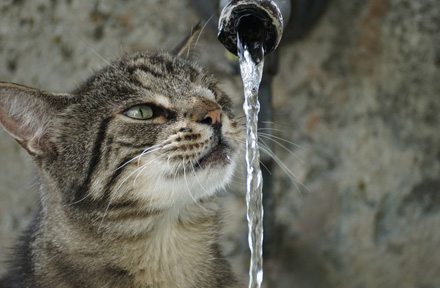Feb 28, 2025
Author:Amanda Lyu
Cats are meticulous groomers, dedicating a large part of their day to keeping themselves clean. However, even with their self-sufficiency, there might be occasions when you need to bathe your cat. Whether they’ve rolled in something sticky, have a skin condition requiring regular baths, or just need some extra assistance in staying clean, deciding whether or not to bathe your cat can be a tricky question.
Pros of Giving Your Cat a Bath

1. Removes Dirt and Debris
Cats, especially those who spend time outdoors, can get dirty or encounter substances that their grooming habits alone cannot handle. Bathing can effectively eliminate dirt, mud, or sticky substances that may have adhered to your cat's fur.
2. Addresses Skin Conditions
Bathing can benefit cats with specific skin conditions like allergies or dermatitis. It helps soothe irritated skin and remove allergens or irritants that may be causing discomfort.
3. Reduces Odors
Sometimes cats may develop unpleasant odors due to various factors such as rolling in something smelly or encountering an odor-producing substance. A bath can help eliminate these odors and leave your cat smelling fresh.
Cons of Giving Your Cat a Bath

1. Natural Oils
Cats’ fur contains natural oils that keep it moisturized and healthy. Frequent bathing can remove these oils, resulting in dry skin and a lackluster coat.
2. Stress and Anxiety
Many cats are notorious for their aversion to water, and the process of bathing can be particularly stressful for them. Forced bathing can cause anxiety and make future grooming sessions more challenging.
Bathing a cat is not typically necessary due to their grooming habits, but there are certain situations where it might be required.
Here are a few scenarios:
Extreme Dirt or Mess: If your cat gets into something very dirty or sticky that they can’t clean off themselves.
Skin Conditions:Medicated baths can be advantageous for cats with specific skin conditions, such as allergies, dermatitis, or fungal infections.
Flea Infestation: Sometimes, bathing is needed to help eliminate fleas or other parasites.
Odor Issues: If your cat has rolled in something with a strong, unpleasant odor.
Contamination: If your cat gets into something toxic or harmful, a bath might be necessary to prevent ingestion or irritation.
For older cats or those struggling with obesity or arthritis, grooming can become challenging. In such cases, a bath can aid in maintaining proper hygiene.
Bathing a cat can be a bit challenging, but with some preparation and care, it can be a smoother experience for both you and your feline friend. Here’s a step-by-step guide:
1. Prepare the Area:
Gather all necessary supplies: cat-specific shampoo, a cup or gentle sprayer, a large towel, and possibly a non-slip mat for the sink or tub.
Choose a small, enclosed space like a bathroom to prevent your cat from escaping easily.
2. Brush Your Cat:
Before giving your cat a bath, it's a good idea to brush them first. This removes any loose fur and tangles, making the bathing process smoother and more effective.
3. Fill the Sink or Tub:
Use lukewarm water. Fill the sink or tub with just a few inches of water, enough to wet your cat but not too deep that it causes distress.
4. Introduce Your Cat to the Water:
Gently place your cat in the water, starting from the feet and then the body. Talk to your cat in a calm and soothing voice to help reduce anxiety.
5. Wet Your Cat's Fur:
Use a cup or gentle sprayer to wet your cat’s fur thoroughly. Be careful to avoid their head and ears.
6. Apply Cat-Specific Shampoo:
Apply a small amount of cat-specific shampoo and lather it gently into your cat’s fur, avoiding the face.
7. Rinse Thoroughly:
Rinse off all the shampoo using the cup or sprayer. Ensure no shampoo is left as it can irritate your cat’s skin.
8. Clean the Head Separately:
Gently use a damp cloth to clean your cat's face and ears, ensuring that water or shampoo doesn't enter their eyes, ears, or nose.
9. Dry Your Cat:
Gently wrap your cat in a large, soft towel and pat them dry. If your cat tolerates it, you can use a hairdryer on the lowest heat setting, keeping it at a safe distance to avoid any discomfort.
10. Comfort and Reward:
After the bath, provide your cat with a quiet, warm space to relax. Offer treats and gentle praise to reinforce positive behavior.
1. Use Cat-Specific Products
Be sure to use shampoos and grooming products that are specifically made for cats. Human shampoos or harsh chemicals can irritate and harm their sensitive skin.
2. Create a Calm Environment
Reduce stress by ensuring a calm and quiet environment during bath time.
3. Use Lukewarm Water
Make sure the water temperature is lukewarm—not too hot or too cold to keep your cat comfortable during the bath.
4. Thorough Rinsing
Thoroughly rinse your cat to ensure all shampoo residue is removed from their fur.”
5. Drying
Most cats prefer to air dry naturally rather than endure the noise and heat of a hairdryer. If you must use a hair dryer, set it to low heat and keep it at a safe distance to avoid burning your skin.
Stay Calm: Cats can sense your anxiety, so staying calm will help keep them more relaxed.
Have an Extra Pair of Hands: If possible, have someone assist you to make the process easier and safer.
Be Patient: Take your time and don’t rush the process to avoid stress for both you and your cat.
Remember, not all cats need regular baths, and some cats might never need a bath. Always prioritize your cat’s comfort and consult with a veterinarian if you have any concerns about giving your cat a bath.
Not all cats are suitable for bathing.
Here are some types of cats that may not be suitable:
Extremely Fearful of Water: If your cat has a strong fear of water, forcing them to bathe may cause significant stress and potentially lead to fear and aggressive behavior.
Cats with Health Issues: Cats with certain health problems, such as respiratory illnesses, heart conditions, or skin diseases, may worsen if bathed without veterinary guidance.
Senior Cats: Older cats are more delicate, and bathing them may increase their stress and affect their health.
Cats with Past Trauma: Cats that have been injured or had negative experiences during previous baths may develop a significant fear of bathing. Please avoid bathing these cats.
Kittens: While kittens can be bathed, extra care is needed. Bathing too early or too frequently can negatively impact their skin and health.
Alternative Options
Regular Brushing: Regular brushing your cat can remove most dirt and loose fur, keeping their coat clean.
Cat-Specific Wipes: Using cat-specific wipes to gently clean their fur can be effective without causing fear.
If you need to bathe your cat but notice they are very scared or uncomfortable, it's best to consult a veterinarian or seek help from a professional groomer.
FAQs about Bathing Cats
Generally, cats do a great job of grooming themselves and don't need regular baths. However, in certain situations, such as extreme dirt, skin conditions, or flea infestations, a bath may be necessary.
Most cats do not need regular baths. Bathing once every few months or as needed for specific situations is usually sufficient. Bathing too often can strip the natural oils from a cat's fur, causing dry skin.
Label:
Popular Post

What to Feed a Sick Dog With No Appetite? [2025 Guide]
May 16, 2023

Troubleshooting Common Issues with Automatic Pet Feeders: Tips & Tricks for Pet Owners
Oct 26, 2023

Why Does My Cat Cough After Drinking Water? 8 Potential Reasons
Mar 13, 2023

Why is My Cat Throwing up Water? Top 5 Causes Here
Feb 08, 2023

My Cat Only Eats A Little at A Time - What to Do?
Feb 27, 2023
$99.99
$129.99
Copyright © 2025 WOPET. All Rights Reserved.